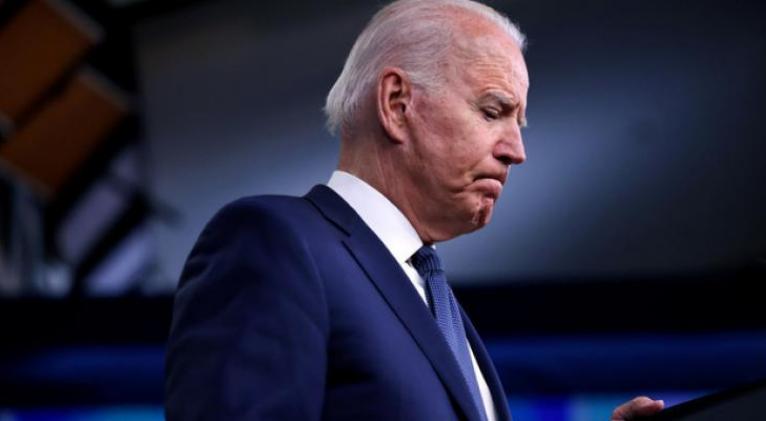Biden inside and outside the U.S.: Two sides of a coin
especiales

Here we are facing a ferocious policy of blockade, aggravated by the actions taken by the previous U.S. administration — which are maintained by the current president — as a result of inequities, false concepts to not benefiting the government in the island without caring for the situation of people amid a new outbreak of the coronavirus pandemic. That is why we fight internally with the purpose to avoid a genocide.
This situation gets worse as a result of the American strategy of fueling disagreement within the population, spreading misinformation, buying people’s will and chanting slogans of a humanitarian policy with the sound of sirens and combat aircrafts dropping bombs humanely, as they did in Panama and Yugoslavia.
Biden is now saying that he is giving some thoughts to the idea of increasing the number of personnel at the U.S. Embassy in Havana, although he makes clear sanctions may actually increase at any moment, which would worsen the situation of the Cuba people even more.
Domestically, nonetheless, we should be aware that he was Vice President of the U.S. under Barack Obama when the latter decided to restore relations with Cuba, and he is now undertaking measures that could not be finalized in that time.
Despite continuous blocking at the U.S. Congress by Republicans, the U.S. president fosters a health-care policy that has achieved pretty good results in the fight against the pandemic — now with new outbreaks — he is trying to avoid that more families may be kicked out to the streets. Besides, he is releasing funds in order to improve, via bonds, the monetary situation of vulnerable groups while trying hard to get the monopolies controlling the nation to contribute with some earnings to stabilizing the citizens’ situation in general.
In other words, in terms of the U.S. domestic economy, he tries to improve the situation of most people in the U.S., something that never occurred under Trump. Likewise, it stands out his fight against the National Rifle Association and his attempt to control the sales of weapons to wane the serious damages it causes.
But regarding his foreign policy — the bad side of the coin — in addition to the aforementioned situation with Cuba, he is still imposing sanctions in all directions against Russia, China, and Iran; not to mention he sends weapons to rebel groups at the service of the U.S. in Syria, where America strengthens its military bases, as in Iraq.
Regardless of the nearly complete withdrawal from Afghanistan, where the U.S. could not win a war initiated twenty years ago, he has just released 19 inmates confined at the illegal military base in Guantanamo — located in Cuban soil —, which might have been done under the previous administration, but Trump froze the issue during his time in office.
OVERREACTION
As to China and Russia, the American political analyst Noam Chomsky says that the U.S. overreacts the threats of both nations as he believes the U.S. is still the main military and economic power. When, as it is now happening, the media allied to the empire markedly publish the development of Russian weapons, the goal is actually to pave the way for the increase of the military budget, the main industry in the U.S.
However, such hostile policy has led Russia and China to become closest allies.
“What we generally find, Chomsky says, is that Russia and China sometimes deter U.S. actions to enforce its global hegemony in regions on their periphery that are of particular concern to them. One can ask whether they are justified in seeking to limit overwhelming U.S. power in this way, but that is a long distance from the way the challenge is commonly understood: as an effort to displace the U.S. global role in sustaining a liberal rule-based international order by new centers of hegemonic power.”
If we take into consideration the systematization of the sanction policy of the U.S. towards other governments that go against their will, we must realize that it becomes an instrument of global power for the U.S. establishment. They are, hence, third-party sanctions. If you disobey, you are done. You may be kicked out from the global financial system, or worse. If we take a look at history, we still hear the echoes from the usual advice President Truman used to give Senator Arthur Vandenberg in 1947: “scare the hell out of the American people” if he wanted to stir fear in them with the unfounded rumor of a Russian threat to dominating the world.
China is challenging the American power…in the South China sea, not in the Atlantic or the Pacific. There is also an economic challenge. In some fields, Beijing is the global leader especially in renewable energy where the Chinese are way ahead of other nations in both volume and quality. They are also the global manufacturing hub.
China’s world influence is expanding safe in investment, trade, facility acquisitions, with the free supply of vaccines or at least at cost price, compared to the monopolization of vaccines by the West and its attempt to ban the distribution of a “popular vaccine” aimed at safeguarding the patents and profits from major companies.
China is also taking huge steps forward in the high tech, to the consternation of the U.S., which is focused on impeding China’s development.
SO WEIRD
It is so weird to believe that the above posts a major challenge to America’s hegemony.
In fact, it happened with Trump and in Biden’s first days. Although Biden did answer back Russia’s call to renew the New START Treaty which limits weapons, safeguarding the only substantial element of the gun control regime that survived the previous administration.
It is crystal clear that negotiations and diplomacy on disputed matters as well as the true cooperation in vital subjects such as global warming, arms control, and future pandemics, which are all serious crisis and go beyond borders, are what we actually need. The fact that the team of foreign policy hawks surrounding Biden going in this direction is pretty uncertain, at best, and scary, at worst. In the absence of significant popular pressure, the perspective does not look good.
Another matter that needs popular awareness and activism is the policy to protect the hegemony by looking to harm potential rivals, as in the case of China, but also in other places, sometimes with unbelievable methods.
You can find a notorious example buried in the Department of Health and Human Services Annual Report 2020, presented by its Secretary Alex Azar. In the chapter “Combating malicious influences in the Americas,” the report discussed the efforts of the Department’s OGA (Office of Global Affairs) to mitigate the efforts of those states, including Cuba, Venezuela, and Russia.
The OGA worked along other U.S. government agencies to strengthen ties and offer technical and humanitarian assistance with the purpose to dissuade countries of the region from accepting help from these “wicked states.” One of the examples consisted in using the office of the OGA sanitary attaché to “persuade Brazil to reject the Russian vaccine against COVID-19, and offered technical assistance by the CDC (Center for Disease Control) if Panama rejected the offer of a Cuban medical assistance.”
Not even water is this clear.
Translated by Sergio A. Paneque Díaz / CubaSí Translation Staff














Add new comment